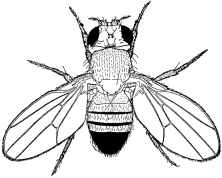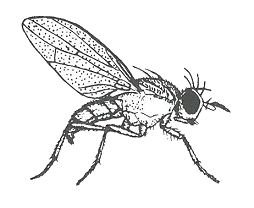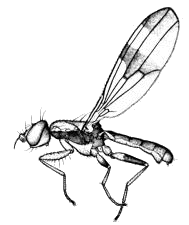Kwik-Key to Common Families of Diptera
Answer for your specimen:
If you have reached this part of the key, your specimen probably belongs to one of the many families of small acalypterate flies that are often hard to distinguish from one another.
Three common possibilities include:
Drosophilidae
Vinegar flies; Pomace flies
Small flies usually with a yellowish body and bright red eyes. The arista of the antenna is generally plumose. This family includes the “fruit fly” often used by geneticists. Adults and larvae are typically found around fruit or decaying vegetation.

Lauxaniidae
Lauxaniid flies
Lauxaniids are usually small, plump flies with large compound eyes that are often iridescent reddish-purple in color. The arista of the antenna is bare. There is a strong pre-apical bristle on the tibia of each leg. Adults are found in moist, shady habitats and larvae are found in decaying vegetation.

Anthomyzidae
Anthomyzid flies
Anthomyzids are small, slender flies that range in color from yellow to black. Their compound eyes are usually black or brown. The arista of the antenna is generally bare. Adults are typically found in moist habitats and larvae are mostly saprophagous.


